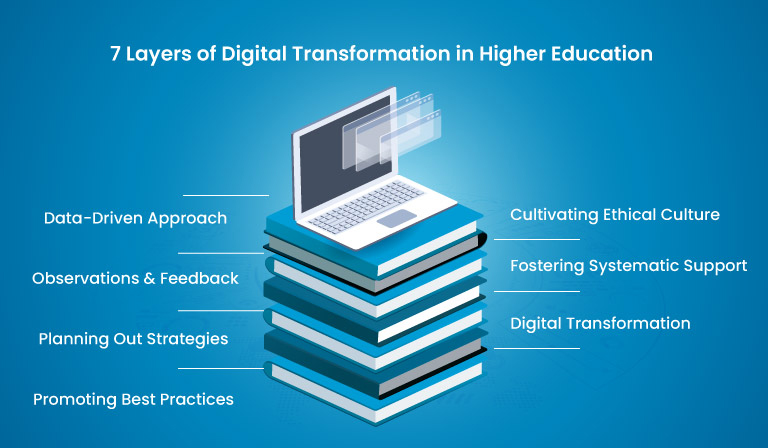Transforming Education Institutions: A Layered Approach for Digital Learning

Digital learning has emerged as a transformative force in higher education, particularly within the realms of science, technology, engineering, and mathematics (STEM). In the rapidly evolving landscape of academia, the roles of professors, educators, and university leaders are pivotal in guiding students towards academic excellence. In this era of rapid technological advancement, empowering students to become autonomous learners is paramount.
This article aims to explore seven essential strategies for universities to seamlessly transition into a digital learning environment, with a specific focus on enhancing STEM education.
7 Layers of Digital Transformation in Higher Education

1. A Data-Driven Approach:
At the core of digital learning lies the utilization of data to inform teaching practices. It transcends traditional methods of instruction by enabling educators to understand students’ learning progress comprehensively. By adopting a data-driven approach, university leaders can equip instructors with valuable insights to customize lesson plans, foster student engagement, and optimize digital learning outcomes.
Harnessing intuitive data reports facilitates efficient academic planning, scheduling, and administrative tasks, thereby creating an environment conducive to academic success. Incorporating tools such as learning analytics and assessment data enables universities to tailor their educational strategies to meet the diverse needs of students.
2. Weekly Observations and Feedback:
Effective teaching and digital education are inherently linked to evaluation and feedback mechanisms. University leaders can implement structured weekly observations to provide educators with targeted feedback, thereby facilitating continuous improvement.
This approach not only empowers educators to refine their teaching methodologies but also alleviates the pressure associated with constant evaluation. By prioritizing specific areas for enhancement, universities can foster a culture of excellence and innovation in STEM education. Feedback mechanisms should focus on both academic performance and the development of essential skills such as critical thinking, problem-solving, and communication.
3. Strategic Lesson Planning:
Efficient lesson planning is essential for optimizing instructional time and maximizing student engagement. University leaders can empower educators by defining clear learning objectives for each lesson, enabling them to develop focused instructional strategies.
Encouraging educators to take ownership of their classrooms fosters comprehensive learning experiences, ultimately enhancing student outcomes and academic success. Incorporating active learning strategies, project-based learning, and collaborative activities promotes deeper understanding and retention of STEM concepts. Embracing emerging technologies such as virtual reality, simulations, and gamification enhances the learning experience and prepares students for real-world challenges.
4. Promoting Best Practices:
Implementing innovative teaching methodologies requires ongoing support and professional development opportunities for educators. University leaders must incentivize educators to explore new pedagogical approaches and evaluate their impact on student learning.
Upholding ethical standards and fostering a culture of continuous improvement cultivates trust, credibility, and a positive learning environment. Encouraging interdisciplinary collaboration and community engagement initiatives enhances the relevance of STEM education and prepares students for future careers in diverse fields. Leveraging industry partnerships and experiential learning opportunities enables students to apply theoretical knowledge to real-world problems, fostering innovation and entrepreneurship.
5. Cultivating Ethical Culture:
Institutional ethics play a crucial role in shaping the character and conduct of educators and students alike. University leaders must establish and uphold high ethical standards aligned with institutional values. Cultivating a culture of integrity, respect, and social responsibility enhances faculty satisfaction, student engagement, and academic excellence.
Encouraging diversity, equity, and inclusion initiatives fosters a supportive learning environment that celebrates the unique perspectives and contributions of all individuals. Emphasizing the importance of ethical decision-making, responsible conduct of research, and academic integrity prepares students to become ethical leaders and global citizens in an interconnected world.
6. Fostering Systematic Support:
Effective leadership involves providing ongoing support and mentorship to faculty members at all stages of their careers. University leaders should engage in regular coaching sessions, offering constructive feedback and guidance to facilitate professional growth and development.
Creating opportunities for peer collaboration, interdisciplinary research, and communities of practice promotes knowledge sharing and innovation within the academic community. Investing in faculty development programs, teaching awards, and research grants recognizes and rewards excellence in teaching, scholarship, and service. Implementing faculty workload policies, mentoring programs, and wellness initiatives supports faculty well-being and promotes work-life balance.
7. Charting the Course for Digital Transformation:
The integration of data-driven decision-making and strategic implementation of transformative strategies lays the foundation for digital transformation in higher education. This journey towards the digital future of education transcends mere aspiration, offering a tangible roadmap for universities to navigate the complexities of digital learning.
By prioritizing these strategies, universities can drive meaningful change and unlock the full potential of digital education in STEM fields. Embracing emerging technologies, pedagogical innovations, and evidence-based practices enables universities to adapt and thrive in an increasingly digital world.
Embracing Möbius: Transforming Digital Learning in Universities
As universities embrace digital transformation, a blended learning platform like Möbius by DigitalEd India emerges as an invaluable tool for enriching teaching and learning experiences. Möbius offers a versatile and intuitive suite of features to facilitate seamless integration of digital learning pedagogies, personalized learning experiences, and data-driven insights.
Empowering universities to navigate the complexities of digital education, Möbius embodies the future of education, revolutionizing the academic landscape and converging innovation with existing pedagogies seamlessly. By leveraging Möbius, universities can unlock new opportunities for collaboration, experimentation, and discovery, paving the way for a brighter future in digital learning.
Want to explore the Möbius experience? Book a personalized demo today!